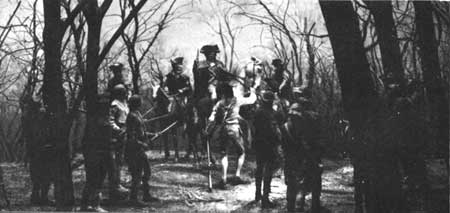|
MORRISTOWN National Historic Park |
 |
January 1781: The Story of Two Mutinies
Early the next winter, which most of Washington's forces spent at New Windsor, on the Hudson River just north of West Point, the New Jersey Line was assigned to quarters at Pompton. The Pennsylvania Line, consisting of 10 infantry regiments and one of artillery, repaired and occupied the log huts built by Hand's and the 1st Connecticut Brigades at Jockey Hollow in 1779—80.
Morale was extremely low at this time among all the Continental troops stationed in New Jersey. Not only did the Pennsylvanians lack clothing and blankets, but they were without a drop of rum to fortify themselves against the piercing cold. Moreover, they had not seen even a paper dollar in pay for over 12 months. Many of the soldiers also claimed that their original enlistments "for three years or during the war" entitled them to discharge at the end of 3 years, or sooner in case the war terminated earlier, and that the officers, by interpreting their enlistments to run as long as the war should last, were unjustly holding them beyond the time agreed upon. Still another cause of irritation was that latecomers in the Continental Army, especially those from New England, had been given generous bounties for enlisting, whereas both the New Jersey and Pennsylvania veterans had already served 3 full years for a mere shadow of compensation.
Maj. Gen. Anthony Wayne, then commanding the Pennsylvanians, had known for a long time that trouble was coming if these grievances were not soon remedied, and had repeatedly urged the authorities of his State to do something about them. His entreaties fell on deaf ears. Tired of pleading, the men at last resorted to mutiny. On the evening of New Year's Day 1781, almost the whole Pennsylvania Line turned our by prearrangement, seized the artillery and ammunition, and prepared to leave the camp. Capt. Adam Bettin was killed, and two other officers wounded, in vain attempts to restore order. Wayne himself, popular though he was with both rank and file, could not persuade the mutineers to lay down their arms. At 11 o'clock that night they marched off toward Philadelphia with the announced intention of carrying their case direct to Congress.
The serious character of this revolt, especially the grave danger that it might spread rapidly to other parts of the Continental Army, was fully appreciated by Washington and his principal officers, including Wayne, who followed and caught up with the mutineers, then voluntarily accompanied them to Princeton. Meanwhile, the men preserved their own order, declared they would turn and fight the British should an invasion of New Jersey be attempted in this crisis, and they handed over to Wayne two emissaries dispatched by Sir Henry Clinton to lure them into his lines with lavish promises. This display of loyalty, the firm stand taken by the mutineers, and at the same time the justness of their complaints, all had effect on representatives of Congress and the Pennsylvania State authorities who came to Princeton to negotiate the whole question. An agreement concluded on January 7 stipulated that enlistments for 3 years or the duration of the war would be considered as expiring at the end of the 3d year; that shoes, linen overalls, and shirts would be issued shortly to the men discharged; and that prompt action would be taken in the matter of back pay. Commissioners appointed by Congress went to work at once to settle the details. More than half the mutineers were released from the army, and the rest furloughed for several months, as a result of the final settlement. Their main grievances removed, many of the men later reenlisted for new bounties. The loss was thus not as great in actuality as had been feared at first.

Gen. Anthony Wayne endeavoring to halt the Pennsylvania mutineers
on New Year's Night 1781.
From a diorama in the historical
museum.
Hardly had the Pennsylvania Mutiny subsided when, on January 20, the New Jersey troops at Pompton also rose in revolt. Although this second insurrection was a comparatively mild affair, Washington took no chances with it. Five hundred men under command of Maj. Gen. Robert Howe were sent to restore order, and early in the morning of January 27, these forces surrounded the camp at Pompton and forced the mutineers to parade without arms. Three ringleaders were condemned to be shot by 12 of their partners in the uprising, but when two had been executed, the third was pardoned. On February 7 following, Washington ordered the chastened New Jersey Brigade to Morristown, there to take up quarters "in the Huts, lately occupied by the Pennsylvanians." The troops remained so posted until July 8, 1781, when the Brigade marched for Kingsbridge on the Hudson.

|
|
Last Modified: Mon, Dec 2 2002 10:00:00 am PDT |


